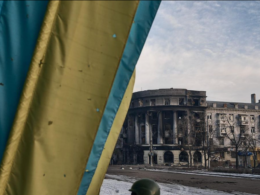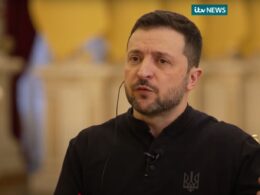On November 28, the final version of the Presidential decree on the imposition of martial law in ten oblasts of Ukraine was published. According to it, martial law came into force starting from 14:00 of November 26 and will last until 14:00 of December 26. So it will not change either the scheduled date of the presidential election campaign or the election day - 31 March 2019.
The move came in response to a Russian attack on Ukrainian sailors in the Azov Sea, in the result of which 24 sailors were captured and transferred to Moscow, and are preparing to be put on trial.
So far, martial law was imposed only in ten oblasts located along the Russian border, Transnistria, and along the coast of the Black and Azov seas, which were said to be at greater risk of a Russian intervention. Despite martial law having been introduced only now, some of these regions have already experienced a state of war, which after an intense battles of Russian and Russian-led separatist forces against the Ukrainian government in the summer of 2014 had is in a smoldering state of frozen conflict, and the establishment of Russian-controlled puppet states, the Luhansk and Donetsk “People’s Republics.”

Alla Morozova, a teacher from Mykolayivka in Donetsk Oblast, is confident that martial law is a helpful step for Ukraine. However, she admits that by far not everybody in her town would support this opinion. Mykolayivka is located about 15 kilometers from the city Sloviansk, a district center from which the Russian-separatist military campaign started in 2014. As well as Sloviansk, Mykolaivka went through battles between Russian-separatist forces and the Ukrainian Army and then was liberated by the Ukrainian forces.
"There are negative attitudes to martial law because there is no understanding of the situation. 'This is the end', 'All men will be taken to the army,' 'the Internet will be cut off,' 'the borders will be closed,' 'Poroshenko will stay in power forever,’ 'It was done to fail the elections,'" Morozova describes the moods in the city.
The woman says that people in her town are scared of the war returning to their streets.
Similar moods are observed in Lysychansk, Luhansk Oblast. During May-July 2014, the city was also under occupation by the Russian-separatist forces and went through active warfare.

"If there is a real threat of seizure of sea and land routes, martial law is needed because no one can predict the actions of the aggressor country. However, the moods in the city are mostly negative. People do not understand that martial law does not mean a total mobilization. The media are trying to explain, but it doesn’t help much. So far, ordinary civilians have not experienced any change, but there are talks every day on whether martial law is needed and its purpose is,"says Olesia Dorofieieva, a teacher from Lysychansk.
According to President Petro Poroshenko, martial law would not affect the lives of civilians much, unless there was a direct military intervention by land. Oleksandr Burmahin, a media lawyer from the Human Rights Platform NGO, explains what it means.
"The Law on martial law has two parts of restrictions. The biggest one is described in its Article 8. It foresees the confiscation of property, cars, civilians hosting soldiers in their flats, censorship - taking down materials, soldiers using radio and TV stations, closing online media and introducing restrictions to the Internet. It all might be introduced only if there is a military operation of the aggressor country on territory outside of occupied Crimea or the territory of the Operation of the Joint Forces [the war zone in Donbas - ed.]. So far the only restrictions which came into force are listed in the 19th article. In particular, referendums do not take place, there are no elections; also, there are restrictions regarding peaceful assemblies and protests."
Nevertheless, this short list already caused heated discussions.
"Now lawyers are having arguments regarding the exact territories where these restrictions are enforced," says Burmahin.
The thing is that the Central Election Commission scheduled the first local elections in 125 united territorial communities for December 23.
"The question is whether elections in the united communities can be held in places where martial law was not imposed. Another question is whether it is possible to have peaceful assemblies in a territory where martial law was not imposed,” explains Burmahin.
Dmytro Shevchenko, a journalist from Kharkiv, a city where martial law also has been introduced, is confident that the measure should have been taken in 2014 when the Russian aggression had just started and should apply to the whole country, not only ten oblasts.
"It would give a push for the country which would help the majority of the population to understand that we really have a war and that we became a subject of the aggression of the Russian Federation. I think we lost the years without it. Those who didn’t believe it would know more by now. Also, all the state institutions would have been working as if under conditions of war. The military structures and the law enforcement bloc would be tuned to respond if aggression would have started across the other borders.“
If martial law doesn't affect civilians that much, what does it change then?
“In general, martial law is applicable and introduces responsibilities only for the Armed Forces, police, law enforcement - they were switched to the enhanced mode. They should relocate and create possibilities for a rapid reaction if Ukraine will be attacked. The law envisages a large number of mechanisms for this: it allows the armed forces to act quickly, introduces legal reasons for their fast reaction, and provides them with everything needed for defending the country. For example,confiscation of cars, providing them with apartments. So armed forces are given the priority. The management of the country and solving current problems are given to them,” says Burmahin.
The lawyer goes on saying that from the international point of view martial law has both advantages and drawbacks.
“One of the drawbacks is that martial law is an obstacle for entering NATO. On the other hand, it is an advantage from the viewpoint of calling everything by its name. It might turn into an advantage in terms of providing international support for the army from countries and alliances. Because it is clear on the official level that it is a pre-war state and the war can start at any moment.”
The lawyer considers 30 days as a term which will avoid creating obstacles for the national election campaigns. Also, it allows estimating the level of Russian aggression and the potential severity of a future attack. Later, the decision on prolonging the martial law can be made.
Also on November 30, Head of the State Border Guard Service Petro Tsyhykal informed that Ukraine will restrict the entrance of Russian men aged from 16-60 years to Ukraine. As well, Ukraine has restricted the entrance of non-Ukrainians to occupied Crimea and the “People’s Republics” in Donbas.
Read also:
- Martial law to be imposed in nearly half of Ukraine. Here is what will change
- Russia takes 24 prisoners of war after attacking Ukrainian ships in Azov, televises “confessions”
- Condemnation and “concerns”: world reaction to Russia’s attack on Ukrainian ships
- FSB tries to explain attack on Ukrainian ships, proves Russia broke its own laws
- Russian attack on Ukrainian ships: who has a right to do what in the Azov Sea





